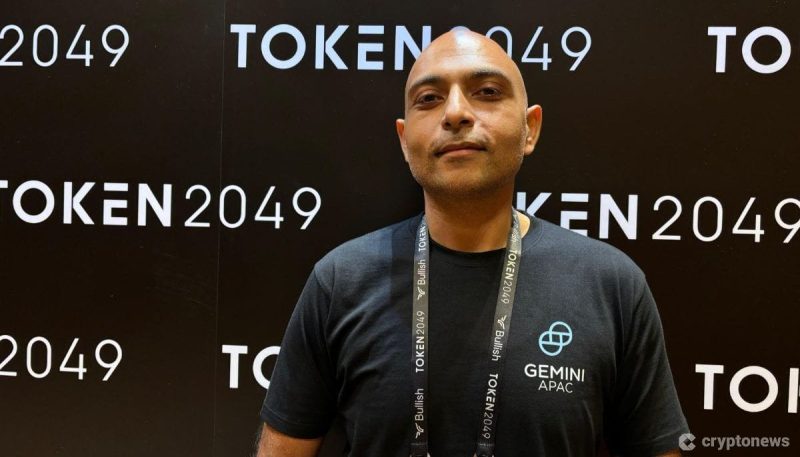In an exclusive chat with Cryptonews.com at TOKEN2049 in Singapore, Saad Ahmed, Gemini’s Head of APAC, discussed the cryptocurrency exchange’s expansion strategies in the region, the unique challenges of operating in Asia, and Gemini’s plans for the future. As one of the leading exchanges globally, Ahmed highlighted the importance of tailoring experiences to local markets while navigating diverse regulatory environments.
Singapore as Gemini’s APAC Hub
Singapore has long been central to Gemini’s strategy in Asia. “Singapore is kind of like our APAC home,” said Ahmed. Gemini launched its Singapore office in 2020, and the city-state has since become the exchange’s main base of operations in the region. Ahmed explained that Gemini’s commitment to Singapore stems from the regulatory clarity and supportive ecosystem that the country offers.
“There’s regulatory clarity here. You know what the rules are, and it’s very clear in terms of how to operate,” he noted. This environment makes Singapore an attractive base for expanding Gemini’s services across Asia. Singapore remains as one of the major hubs for builders and innovators in Web3. According to Ahmed, this kind of energy reflects the broader growth potential in the region.
Building Localized Experiences for APAC Markets
Ahmed stressed that one of Gemini’s key strategies for APAC is delivering localized experiences to users. “We’re focused on building localized experiences for users,” Ahmed explained. This involves developing products and services tailored specifically for the region, such as localized onboarding processes for customers and institutions, and easier, frictionless payment options.
Gemini’s Singapore office is not just a regulatory base but also serves as the company’s engineering hub outside the U.S. Ahmed highlighted that the company is investing in building teams in Singapore, with plans to expand into other markets in the region.
“We’re expanding our engineering team so we see localized experiences being built in Asia for Gemini, specifically from our Singapore hub, and expanding across the region as well. We’re looking at a few different markets from here to expand into, and we’ll have more to share on that in a few months.”
Unique Regulatory Challenges Across Asia
While Singapore offers a clear regulatory framework, other markets in Asia are more complex. For example India, which recently ranked for the second time as the top country in terms of crypto adoption as per a Chainalysis report, presents unique challenges. However, Gemini decided to exit the Indian market due to regulatory uncertainty earlier this year. Ahmed noted that the lack of clear regulations made it difficult for Gemini to operate in India, though he hinted at a potential return if the regulatory landscape improves.
“One of the broader problems in the industry that we face, which is that regulation isn’t consistent. So you have markets like Singapore, where there’s a regulatory clarity, you know what the rules are, and how to comply by the rules, and it’s very clear in terms of how to operate. So it’s an environment where it’s conducive to build because you know what needs to be done. However, there are other jurisdictions where it’s not so clear, and so that makes it difficult for companies like us to operate.”
However, Ahmed expressed optimism that regulations are going to catch up over time as we see more innovation.
Singapore vs. Dubai: Competing Hubs
Gemini’s competitors have sometimes looked beyond Singapore to other emerging hubs like Dubai, which has attracted a wave of crypto firms due to its more lenient regulatory approach. Ahmed acknowledged this trend but defended Gemini’s decision to stay rooted in Singapore. He praised Singapore’s focus on consumer protection and its active dialogue between regulators and the crypto industry.
“We’ve been in Singapore for a really long time, so we were committed to Singapore, we have a lot of engagement with the regulator. In fact, we think probably the fact that there is sort of regulatory certainty in Singapore is a good thing, and that’s why you see sort of this concentration in these two places.”
Shifting Influence from the West to Asia
In discussing the impact of the crypto industry in the U.S. on Asia, Ahmed noted that the overall crypto industry is significantly influenced by the substantial capital flowing from the U.S. into the crypto market. He acknowledged this dynamic as a direct factor affecting the ecosystem but emphasized that the dispersion of the industry across the globe is gradually lessening the U.S. dominance.
He further pointed out the increasing number of projects emerging in the Asia-Pacific (APAC) region, highlighting that trading volumes and activity in APAC have been shifting positively over time. He expressed confidence that APAC will continue to grow, likely at a faster pace than other markets, which he believes will ultimately propel the entire industry forward.
Looking Ahead: A Year of Momentum
Ahmed, who joined Gemini as APAC head 10 months ago after leading major projects at Uber and Grab, expressed optimism about the future. He described 2024 as a year of positive momentum for the crypto industry, driven by developments like the potential launch of Bitcoin spot ETFs. “The year is moving in the right direction,” he remarked, confident that Gemini’s focus on localized innovation and regulatory clarity would drive its growth in APAC.
The post Interview: Gemini APAC Head Saad Ahmed Discusses Expansion into Asia and Navigating Regulatory Challenges appeared first on Cryptonews.


